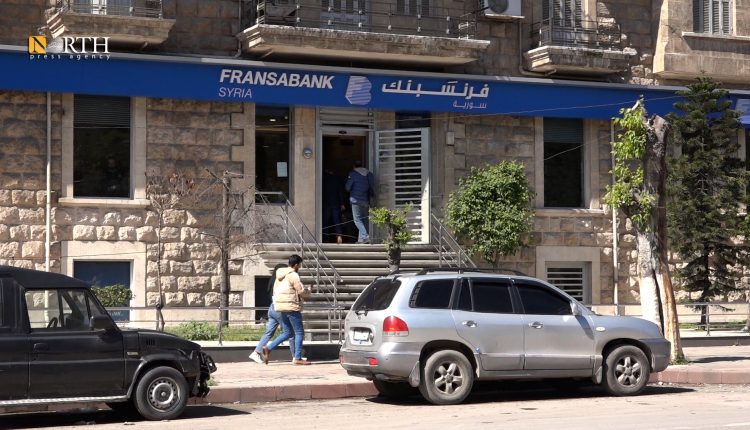By Nurradin Omar
ALEPPO, Syria (North Press) – The city of Aleppo in northwestern Syria grapples with a deepening crisis in the real estate and automobile sectors, as severe banking restrictions and the ongoing closure of key government offices paralyze transactions and limit residents’ access to their own funds.
Residents of Aleppo are unable to withdraw their money from banks, amid the closure of the Directorate of Transportation and the Land Registry since the fall of the al-Assad regime in December 2024.
Under the former regime, banks, under directives from the Central Bank of Syria, imposed strict restrictions on cash withdrawals, lowering the withdrawal limit to just 250,000 Syrian pounds (SYP, which equals about $23)—a sum insufficient to cover a family’s basic needs.
No change
Talat Najjar, 60, a real estate office owner in Aleppo, told North Press that these restrictions are still in place after the regime’s fall, with no adjustments or changes yet made to Syria’s banking system.
Najjar explained that the banking system in Syria forces residents selling their homes or cars to receive their payments through bank deposits by the buyers, as a prerequisite for completing the sale and purchase transactions at the Land Registry or Transportation Directorate.
He added that after the fall of the regime, some matters have not improved but rather deteriorated, such as the decline in real estate transactions in the city, attributing this to residents’ inability to withdraw previously deposited sums from banks.
He continued, “If we want to withdraw the amount, the bank only disburses 200,000 Syrian pounds per day.”
Najjar pointed out that buyers lose around 20 million SYP ($1,818) for every 100 million SYP ($9,090), leading to a sharp decline in purchasing power.
He also noted another manipulation tactic used by bank traders, converting the amounts into U.S. dollars at an exchange rate of between 16,000 and 17,000 SYP per dollar, while the official bank rate stands at 12,150 SYP per dollar.
Obstructing production
Montaser Khowatmi, 57, an engineer and owner of a commercial facility in Aleppo, said his business has nearly ground to a halt due to his inability to withdraw money needed to purchase raw materials and restart production.
He added that when he sells goods to traders, payments are made via bank transfers, meaning he cannot benefit from the money, which remains stuck in the banks.
Khowatmi pointed out that he is unable to purchase a car because his money is trapped in the bank, while car owners refuse to accept payment through bank deposits. He called on the transitional government to ease money flow from banks to boost economic activity and revive daily life for citizens and traders.
Factory owners are suffering from their inability to easily withdraw their funds, leading to financial losses that negatively impact food prices. Since traders and business owners refuse to absorb these losses, the biggest losers remain the ordinary citizens.
Meanwhile, Radwan Na’noo’, 52, a resident of Aleppo, told North Press that banks are monopolizing residents’ needs through restrictions on their money, which weakens purchasing power in the markets.
He added, “If we want to buy a car or a house, there are no deeds or property registration,” pointing out that if this situation continues, reconstruction will be impossible even after the displaced return.
Following the fall of the al-Assad regime on Dec. 8, 2024, all government offices in Aleppo initially shut down. Some were later gradually reopened, while others, such as the Transportation Directorate and Land Registry, remain closed as of the time of writing this report. This has fueled residents’ fears regarding the buying and selling of cars and houses due to the lack of guarantees for sales and purchase contracts.

